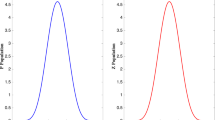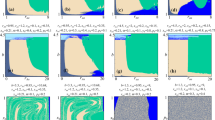Abstract
A model for the effects of a predator on a genetically distinguished prey population is formulated and investigated. Equilibria are determined and analyzed for both the complete system and the predator-free subsystem. A control on the genotype of the prey population harming the predators is then added and an optimal control is sought. Numerical simulations are performed to determine how the controlled system behaves and how parameter changes affect the system.











Similar content being viewed by others
References
Venturino, E.: An ecogenetic model. Appl. Math. Lett. 25, 1230–1233 (2012)
Viberti, C., Venturino, E.: An ecosystem with Holling type II response and predators’ genetic variability. Math. Model. Anal. 19, 371–394 (2014)
Usville, I., Viola, C.P., Venturino, E.: An ecogenetic disease-affected predator-prey model. Cogent Math. 3(1), 1195716 (2016). doi:10.1080/23311835.2016.1195716
Grant, B.S.: Fine tuning the peppered moth paradigm. Evolution 53(3), 980–984 (1999)
Clarke, B.: Heredity—the art of innuendo. Heredity 90(4), 279–280 (2003). doi:10.1038/sj.hdy.6800229
Hooper, J.: Of Moths and Men: An Evolutionary Tale. W.W. Norton & Company, New York (2002)
Lively, C.M., Apanius, V.: Genetic diversity in host–parasite interactions. In: Grenfell, B.T., Dobson, A.P. (eds.) Ecology of Infectious Diseases, pp. 419–449. Cambridge University Press, Cambridge (1995)
Vrijenhoek, R.C.: The origin and evolution of clones versus the maintenance of sex in Poeciliopsis. J. Hered. 84, 388–395 (1993)
Read, A.F.: Passerine polygyny: a role for parasites? Am. Nat. 138, 434–459 (1991)
Lenhart, S., Workman, J.T.: Optimal Control Applied to Biological Models. Chapman & Hall/CRC, Boca Raton (2007)
Ledzewicz, U., Schättler, H.: Optimal bang–bang controls for a two-compartment model in cancer chemotherapy. J. Optim. Theory Appl. 114(3), 609–637 (2002)
Silva, C.J., Torres, D.F.M.: Optimal control strategies for tuberculosis treatment: a case study in Angola. Numer. Algebra Control Optim. 2(3), 601–617 (2012)
Silva, C.J., Torres, D.F.M.: Optimal control for a tuberculosis model with reinfection and post-exposure interventions. Math. Biosci. 244(2), 154–164 (2013)
Rodrigues, P., Silva, C.J., Torres, D.F.M.: Cost-effectiveness analysis of optimal control measures for tuberculosis. Bull. Math. Biol. 76(10), 2627–2645 (2014)
Silva, C.J., Maurer, H., Torres, D.F.M.: Optimal control of a tuberculosis model with state and control delays. Math. Biosci. Eng. 14(1), 321–337 (2017)
Rodrigues, H.S., Monteiro, M.T.T., Torres, D.F.M.: Dynamics of dengue epidemics when using optimal control. Math. Comput. Model. 52(9–10), 1667–1673 (2010)
Rodrigues, H.S., Monteiro, M.T.T., Torres, D.F.M.: Vaccination models and optimal control strategies to dengue. Math. Biosci. 247, 1–12 (2014)
Pontryagin, L.S., Boltyanskii, V.G., Gamkrelidze, R.V., Mishchenko, E.F.: The Mathematical Theory of Optimal Processes. Interscience, English translation (1962)
Mangasarian, O.L.: Sufficient conditions for the optimal control of nonlinear systems. SIAM. J. on Control. 4(1), 139–152 (1965)
Acknowledgements
Work partially supported by the project “Metodi numerici in teoria delle popolazioni” of the Dipartimento di Matematica “Giuseppe Peano” of the Università di Torino.
Author information
Authors and Affiliations
Corresponding author
Rights and permissions
About this article
Cite this article
Cecchetti, A., Ferragamo, P., Zampini, A. et al. Optimal Control of an Ecogenetic Model. Int. J. Appl. Comput. Math 3 (Suppl 1), 473–488 (2017). https://doi.org/10.1007/s40819-017-0365-x
Published:
Issue Date:
DOI: https://doi.org/10.1007/s40819-017-0365-x




